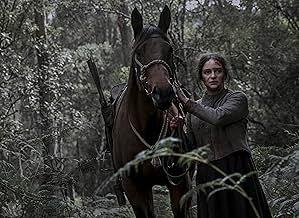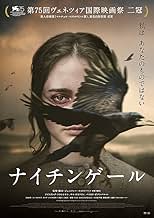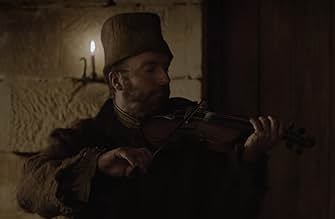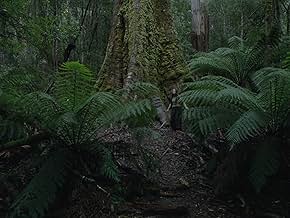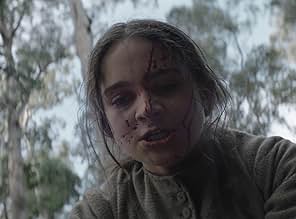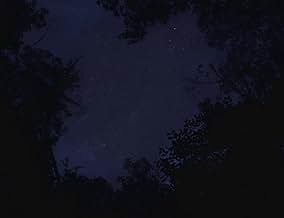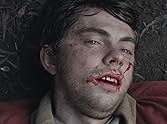En 1825, une jeune femme irlandaise poursuit un officier britannique pour se venger d'un terrible acte qu'il a commis contre sa famille. Elle fait appel aux services d'un traqueur nommé Bill... Tout lireEn 1825, une jeune femme irlandaise poursuit un officier britannique pour se venger d'un terrible acte qu'il a commis contre sa famille. Elle fait appel aux services d'un traqueur nommé Billy, également traumatisé par son violent passé.En 1825, une jeune femme irlandaise poursuit un officier britannique pour se venger d'un terrible acte qu'il a commis contre sa famille. Elle fait appel aux services d'un traqueur nommé Billy, également traumatisé par son violent passé.
- Réalisation
- Scénario
- Casting principal
- Récompenses
- 25 victoires et 37 nominations au total
Matty Barker
- Goodwin's Ensign
- (as Matthew Barker)
Avis à la une
The most brutal and intense movie i've ever seen in my life.
People walked out, someone fainted. Completely unflinching and horrifying from start to finish, and many scenes made me so uncomfortable i didn't want to watch anymore. Jennifer Kent is the only person who could have made this film, and her exploration of female trauma and colonialism's impact on the aboriginal peoples of Australia & Tasmania was incredible. I'm gonna go throw up now.
People walked out, someone fainted. Completely unflinching and horrifying from start to finish, and many scenes made me so uncomfortable i didn't want to watch anymore. Jennifer Kent is the only person who could have made this film, and her exploration of female trauma and colonialism's impact on the aboriginal peoples of Australia & Tasmania was incredible. I'm gonna go throw up now.
Greetings again from the darkness. With only her second feature film, Jennifer Kent (THE BABADOOK) has created a near cinematic masterpiece. The only thing holding it back is the historical subject matter and the no-holds-barred approach that will surely limit its audience. From an emotional aspect, the film is extraordinarily uncomfortable and disturbing to watch; however, from a filmmaking perspective, it's a thing of beauty. The two sides of my brain were at war the entire time.
Set in 1825 Tasmania, the opening scenes are ominous and cloaked in dread - even though nothing has happened (yet). We just feel it in our bones ... things are about to go wrong. And oh my, do they ever go wrong. Now you are likely similar to me in that your knowledge of 1825 Tasmanian history is quite limited. This was the era of "The Black War". The British were in the midst of colonizing the country. Violence was prevalent towards women, native Aboriginals, and even the land and existing culture.
Clare (Aisling Franciosi, "The Fall") is a young Irish woman, recently married with a newborn. She has served her 7 year sentence for theft (likely food for survival) and is now an improperly indentured servant to the ambitious and quietly despicable Lieutenant Hawkins (Sam Claflin, THE HUNGER GAMES). Clare is headstrong, but wise enough to understand her place. Her husband Aidan (Michael Sheasby, HACKSAW RIDGE) lacks the same judgement and his foolish attempts to deal directly with Hawkins results in the atrocity that leads to the core of the story.
When her pleas for justice fall on the deaf ears of the British military, Clare's need for vengeance transforms her into a woman-obsessed. Due to the harsh elements of the Tasmanian forest, Clare reluctantly agrees to hire an equally reluctant Aboriginal tracker/guide. Billy (Baykali Ganambarr) takes the job, and the two have little respect for each other as the trek begins. As a female Irish convict, Clare was treated poorly by the British, yet she somehow views herself as superior to Billy. On the other hand, Billy lumps all white people into the category of those to hate and distrust. This pair make quite a statement on racism, classism and pre-judging others. Of course, as their journey continues, their similar backgrounds and commonalities are revealed, bringing these two broken people closer together and building mutual respect.
This is a part of history that Australia understandably doesn't work to keep in the forefront. But the atrocities were very real and Ms. Kent's film never shies away from the gut-punch of a moment. And though it takes place during this dark period with numerous appalling characters, the core element to the Clare's story is determining the consequences and price of seeking vengeance. How does one hold on to compassion and humanity while trapped in an environment that is barely survivable? Does violence truly beget violence? Is there another way? One of the most striking elements of the story is the contrast of mindless slaughter against the intimacy of vengeance. The British soldiers seem to pay little mind to their victims, while Clare is an emotional wreck when violence is required. It's quite a thought-provoking debate.
This is the first leading role for Aisling Franciosi and she is a marvel. Clare is quite a complex character and Ms. Franciosi is remarkable ... as is her singing voice. Also impressive is the performance of Baykali Ganambarr as Billy. Known as a stage performer, this is Mr. Ganambarr's first film role and he is terrific and believable as a young man looking to move on from a life that hasn't been kind or fair. Other key supporting roles include Damon Herriman ("Justified") as Hawkins' right hand man, and Charlie Shotwell (CAPTAIN FANTASTIC) as young Eddie. All performances are strong, and filmmaker Kent was obviously attuned to presenting the authenticity of the period, even down to the spoken language. The costumes never look like something out of a Hollywood warehouse and cinematographer Radek Ladczuk captures the harshness of the land and brutality of the people. It's a gripping tale focused on the reaction to the deepest of personal loss. The reward is there for those brave enough to give it a watch.
Set in 1825 Tasmania, the opening scenes are ominous and cloaked in dread - even though nothing has happened (yet). We just feel it in our bones ... things are about to go wrong. And oh my, do they ever go wrong. Now you are likely similar to me in that your knowledge of 1825 Tasmanian history is quite limited. This was the era of "The Black War". The British were in the midst of colonizing the country. Violence was prevalent towards women, native Aboriginals, and even the land and existing culture.
Clare (Aisling Franciosi, "The Fall") is a young Irish woman, recently married with a newborn. She has served her 7 year sentence for theft (likely food for survival) and is now an improperly indentured servant to the ambitious and quietly despicable Lieutenant Hawkins (Sam Claflin, THE HUNGER GAMES). Clare is headstrong, but wise enough to understand her place. Her husband Aidan (Michael Sheasby, HACKSAW RIDGE) lacks the same judgement and his foolish attempts to deal directly with Hawkins results in the atrocity that leads to the core of the story.
When her pleas for justice fall on the deaf ears of the British military, Clare's need for vengeance transforms her into a woman-obsessed. Due to the harsh elements of the Tasmanian forest, Clare reluctantly agrees to hire an equally reluctant Aboriginal tracker/guide. Billy (Baykali Ganambarr) takes the job, and the two have little respect for each other as the trek begins. As a female Irish convict, Clare was treated poorly by the British, yet she somehow views herself as superior to Billy. On the other hand, Billy lumps all white people into the category of those to hate and distrust. This pair make quite a statement on racism, classism and pre-judging others. Of course, as their journey continues, their similar backgrounds and commonalities are revealed, bringing these two broken people closer together and building mutual respect.
This is a part of history that Australia understandably doesn't work to keep in the forefront. But the atrocities were very real and Ms. Kent's film never shies away from the gut-punch of a moment. And though it takes place during this dark period with numerous appalling characters, the core element to the Clare's story is determining the consequences and price of seeking vengeance. How does one hold on to compassion and humanity while trapped in an environment that is barely survivable? Does violence truly beget violence? Is there another way? One of the most striking elements of the story is the contrast of mindless slaughter against the intimacy of vengeance. The British soldiers seem to pay little mind to their victims, while Clare is an emotional wreck when violence is required. It's quite a thought-provoking debate.
This is the first leading role for Aisling Franciosi and she is a marvel. Clare is quite a complex character and Ms. Franciosi is remarkable ... as is her singing voice. Also impressive is the performance of Baykali Ganambarr as Billy. Known as a stage performer, this is Mr. Ganambarr's first film role and he is terrific and believable as a young man looking to move on from a life that hasn't been kind or fair. Other key supporting roles include Damon Herriman ("Justified") as Hawkins' right hand man, and Charlie Shotwell (CAPTAIN FANTASTIC) as young Eddie. All performances are strong, and filmmaker Kent was obviously attuned to presenting the authenticity of the period, even down to the spoken language. The costumes never look like something out of a Hollywood warehouse and cinematographer Radek Ladczuk captures the harshness of the land and brutality of the people. It's a gripping tale focused on the reaction to the deepest of personal loss. The reward is there for those brave enough to give it a watch.
This film tells the story of a woman who seeks revenge in Australia two hundred years ago.
This is a very dark story, and is eerily engaging. Her experiences are highly traumatic, and there is just no way viewers can be immune to tears. I find myself rooting for her, and hoping her to get what she wants. It is a really good story, and acting by the lead characters is very convincing too.
This is a very dark story, and is eerily engaging. Her experiences are highly traumatic, and there is just no way viewers can be immune to tears. I find myself rooting for her, and hoping her to get what she wants. It is a really good story, and acting by the lead characters is very convincing too.
Two hours is a hell of a long time to sit through what is essentially, quite possibly one of the most disturbing movies of all time.
What sets this film apart from the disturbing movies labeled under "horror", is that the excessive violence (sexual, racial, gender-based, vengeful and genocidal) pretty much all throughout this film is based on real life - The Black War in 1820s Van Dieman's Land, now known as Tasmania.
Clare and Billy, the two protagonists are hated minorities in this land (An Irish female convict and a black man) who seek vengeance for the terrible crimes committed against their families and themselves. The film begs the question - how does empathy survive in such a brutal world? How do you move on after you've lost so much? And finally, does vengeance bring satisfaction?
The answers are No to the last two and Yes to the first one.
I don't know if I can recommend this. It felt like the director was subjecting her audience to a horrific punishment with this. It essentially left me traumatised. Even in the moments when a character says a funny line, it's always followed with a horrific act of violence straight afterwards.
Other than that, the acting, especially Aisling Franciosi and Baykali Ganambar, are extraordinary. I believed every second of their performances. The way it's shot, the landscape and the cinematography, is gorgeous.
Watching this was a hell of a challenge. But I'm glad I got through it.
What sets this film apart from the disturbing movies labeled under "horror", is that the excessive violence (sexual, racial, gender-based, vengeful and genocidal) pretty much all throughout this film is based on real life - The Black War in 1820s Van Dieman's Land, now known as Tasmania.
Clare and Billy, the two protagonists are hated minorities in this land (An Irish female convict and a black man) who seek vengeance for the terrible crimes committed against their families and themselves. The film begs the question - how does empathy survive in such a brutal world? How do you move on after you've lost so much? And finally, does vengeance bring satisfaction?
The answers are No to the last two and Yes to the first one.
I don't know if I can recommend this. It felt like the director was subjecting her audience to a horrific punishment with this. It essentially left me traumatised. Even in the moments when a character says a funny line, it's always followed with a horrific act of violence straight afterwards.
Other than that, the acting, especially Aisling Franciosi and Baykali Ganambar, are extraordinary. I believed every second of their performances. The way it's shot, the landscape and the cinematography, is gorgeous.
Watching this was a hell of a challenge. But I'm glad I got through it.
A very good movie of Australia's past history how the settlers treated the aboriginals and the convicts deported from England. Not too much is known of these happenings, but this film shows the stark realities of those days, almost two hundred years ago.
The story is fictional but fits perfectly in this era and could have been true. Beautifully told and acted by the main characters giving one food for thought to ponder over.
A top class dramatic movie worth seeing.
The story is fictional but fits perfectly in this era and could have been true. Beautifully told and acted by the main characters giving one food for thought to ponder over.
A top class dramatic movie worth seeing.
Le saviez-vous
- Anecdotes"I've always had a fascination with Tasmania," writer-director Jennifer Kent said. It was considered the most brutal of the Australian colonies, known as 'hell on earth' through the western world at the time. Repeat offenders were sent there; the rapists, murderers, hardened criminals. And severe punishments were devised for them to strike fear in the hearts of those back in Britain, to deter them from crime. Women on the other hand, who'd often committed minor crimes, were sent to Tasmania to even the gender balance. They were outnumbered eight to one. You can imagine what kind of an environment that would set up for women. It was not a good place or time for them. And in terms of the Aboriginal invasion, what happened in Tasmania is often considered the worst attempted annihilation by the British of the Aboriginal people and everything they hold dear."
- GaffesClare's dress, when singing to the soldiers, appears to have a zip up the back.
(0:04:21) Seen as she was dressing for the recital, it was hooks and eyes, not a zipper, fastening her dress. Very much of the period.
- Crédits fous" Tasmanian Aboriginal culture is a living culture. The Aboriginal language used in this film is called 'Palawa kani'. It was created by current day Tasmanian Aboriginal people using records of their original languages. Aboriginal actors cast in this film are from mainland Australia. They and we pay our respects to the aboriginal people of Lutruwita (Tasmania) past and present."
- ConnexionsFeatured in Chris Stuckmann Movie Reviews: The Nightingale (2019)
- Bandes originalesThe Nightingale
Performed by Aisling Franciosi
Violin by Charles McCarthy
Written by Ciáran Bourke, Barney McKenna, Ronnie Drew and Luke Kelly
Published by Logo Songs Ltd
Administered by Universal Music Publishing MGB Australia Pty Ltd
Meilleurs choix
Connectez-vous pour évaluer et suivre la liste de favoris afin de recevoir des recommandations personnalisées
- How long is The Nightingale?Alimenté par Alexa
Détails
- Date de sortie
- Pays d’origine
- Sites officiels
- Langues
- Aussi connu sous le nom de
- Chim Sơn Ca Trả Thù
- Lieux de tournage
- Sociétés de production
- Voir plus de crédits d'entreprise sur IMDbPro
Box-office
- Budget
- 2 000 000 $US (estimé)
- Montant brut aux États-Unis et au Canada
- 400 209 $US
- Week-end de sortie aux États-Unis et au Canada
- 35 882 $US
- 4 août 2019
- Montant brut mondial
- 988 687 $US
- Durée2 heures 16 minutes
- Couleur
- Mixage
- Rapport de forme
- 1.37 : 1
Contribuer à cette page
Suggérer une modification ou ajouter du contenu manquant







